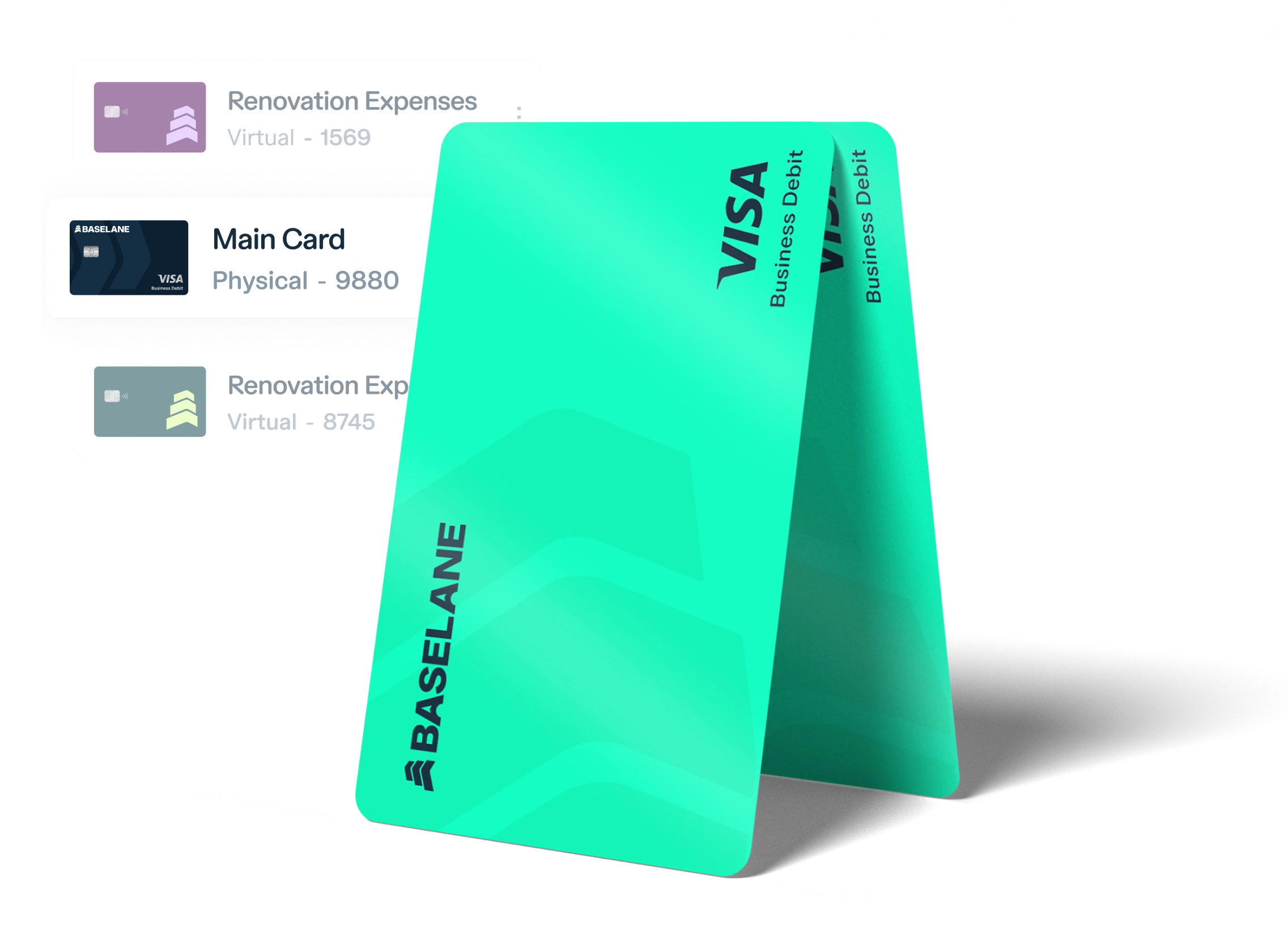Managing finances for even one rental property can be overwhelming; add more, and things get complicated fast. Without a clear system, you risk accounting headaches, compliance issues, and weakened asset protection. That’s why learning how to structure business bank accounts is critical for serious landlords and real estate investors.
A solid banking structure brings clarity, streamlines operations, simplifies taxes, and protects your assets. It helps you track income and expenses by property or entity, offering a clear view of performance. This guide covers why structure matters, common approaches for managing multiple rentals, and how to choose the best system for your business.
Key features
- Open a dedicated business bank account for each LLC or property to maintain legal separation and protect your assets.
- Avoid commingling by keeping business, personal, and tenant funds (like security deposits) in separate operating reserve accounts.
- As you expand or adjust your LLC structure for multiple rental properties, update your banking setup to match for long-term success.
- Leverage Baselane’s banking platform for real estate to organize funds in property-level accounts and automate transaction categorization, expense tracking, and rent collection, saving time and reducing manual errors.
Why banking structure matters for rental properties
Think of managing multiple rental properties like running several small businesses. If you tried tracking the finances of five businesses through one personal checking account, you’d struggle to see which was profitable, where costs were rising, or how each performed.
The same applies to rental properties; each one (or group under a legal entity) needs its own financial identity. That’s where having the right business bank account structure makes all the difference.
Here’s why how to structure business bank accounts for rental properties is so important:
- Asset protection: If your rentals are owned by an LLC, using a dedicated bank account reinforces the legal boundary between your personal and business assets. Mixing funds, called commingling, can jeopardize your liability protection.
- Accurate accounting: Separate reserve bank accounts make it easy to track rent income and expenses for each property. You’ll get a clearer view of your portfolio’s cash flow and performance, which supports smarter decisions.
- Simplified tax prep: Clean, organized bank records streamline tax season. It’s easier to pull reports, categorize deductions, and hand everything off to your accountant with confidence.
- Professionalism: Tenants, vendors, and lenders take your operation more seriously when you use a proper business banking setup. It shows you’re running a real business, not just a side hustle.
- Efficiency: The right banking structure, especially when paired with rental property software, saves time on reconciliation and reporting—no more digging through mixed personal and business transactions.
Banking Built for Real Estate Business
Online unlimited accounts for properties and security deposits with no monthly fees.
Understanding business structures for rental properties
Before setting up your sole proprietorship bank account structure, it’s important to understand how your legal entity impacts your banking setup. While this article focuses on banking, your choice of business structure shapes how you organize your finances, especially as your portfolio grows or you explore structured finance investment banking strategies.
Here are the most common structures landlords use:
- Sole proprietorship/partnership: Simple to set up, but offers no personal liability protection—your assets are exposed to property-related risks.
- S or C Corporation: Less common for small landlords due to complex tax rules and administrative overhead.
- Limited Liability Company (LLC): A popular choice for rental properties. LLCs offer liability protection, pass-through taxation, and are easier to manage than corporations.
For landlords with multiple properties, here are typical LLC structures:
- One LLC for all properties: Easier to manage, but exposes all properties to shared liability if something goes wrong.
- One LLC per property: Offers strong liability protection by isolating each property, but requires more paperwork, including separate HOA bank accounts.
- Holding company with subsidiary LLCs: A central LLC owns individual property LLCs. This layered approach adds protection and can simplify ownership organization.
No matter the structure, maintaining separate bank accounts for each LLC is essential. It ensures legal separation, supports clean accounting, and protects your assets, especially if you’re aiming for long-term growth and more sophisticated financing options.
Common banking structures for multi-property landlords
If you own multiple properties and possibly multiple LLCs, you may wonder how to structure your rental property bank account setup. While there’s no one-size-fits-all answer, the best business structure for multiple rental properties depends on your portfolio size, risk tolerance, and how much complexity and tracking detail you’re comfortable managing.
Here are common approaches for the best business bank account structure:
One bank account for all properties (under one entity)
This is the simplest approach to how to structure business bank accounts when all properties are under one LLC or owned personally. All income and expenses for all properties flow through a single dedicated business bank account for landlords.
- Pros: Easy to set up and manage initially. Fewer accounts to reconcile.
- Cons: Provides minimal liability isolation between properties if they are within the same LLC (though the LLC still offers some protection from personal assets). Makes it difficult to assess the profitability of individual properties without meticulous sub-tracking outside the bank account. High risk of commingling if not careful.
- This structure is generally only advisable for very small portfolios (1-2 properties) held under a single strong entity, or for personal ownership where asset protection from the business itself is not the primary concern.
One bank account per property (under one or multiple entities)
In this model, each property has its dedicated bank account.
- Pros: Offers the highest level of financial tracking granularity per property. Makes it easy to see the income and expenses tied to a specific address.
- Cons: Can become administratively overwhelming with many properties, requiring numerous accounts to manage and reconcile each month. If all properties are under a single LLC, having separate bank accounts for each property does not provide the same level of liability protection as having separate LLCs for each property with corresponding separate accounts.
One bank account per LLC
If you use an LLC structure for multiple rental properties, such as one LLC per property or per property group, each LLC must have its dedicated bank account. This isn’t optional; it’s essential for keeping entities legally and financially separate. It’s the standard approach to property management bank account structure when managing multiple entities.
- Pros: Crucial for maintaining the corporate veil and maximizing asset protection by isolating liability within each LLC. Provides clear financial separation for accounting and tax purposes per entity.
- Cons: Requires setting up and managing multiple business bank accounts, one for each LLC. It can increase administrative complexity depending on the number of LLCs.
Holding company LLC with subsidiary accounts
This structure often involves a main holding LLC and several subsidiary LLCs, each holding properties. The banking structure could involve a main operating account at the holding company level and separate accounts for each subsidiary LLC. This is part of a broader structured banking approach.
- Pros: Provides layers of asset protection. Can centralize some administrative functions or funding at the holding level while maintaining separation at the subsidiary level.
- Cons: Complex legal and banking setup. Requires significant administrative effort to manage multiple entities and accounts. Often used for large, sophisticated portfolios.
How to structure business bank accounts for your portfolio
Deciding how to structure bank accounts comes down to balancing asset protection, accounting needs, and administrative capacity. Here’s a practical look at implementing a structure that contributes to the overall banking structure of your business.
Entity-level banking for LLCs and portfolios
If you have opted for LLCs, understanding entity-level banking is non-negotiable. To correctly structure a rental property bank account when using an LLC:
- Obtain an EIN: Each LLC needs its own Employer Identification Number (EIN) from the IRS. This is required to open a business bank account in the LLC’s name.
- Open a business bank account: Use the LLC’s EIN and legal formation documents to open a dedicated business bank account. The account title must exactly match the legal name of the LLC. This is your bank account for landlords.
- Fund the account properly: Deposit initial capital into the LLC account from your funds or the holding company’s funds, and document these capital contributions, especially if the account will also hold tenant funds or earn interest, such as when tracking the interest rate on security deposit accounts.
- Use the account exclusively for business: Deposit all rental income into this account, and pay all property-related expenses from it. Never use it for personal spending or to cover business expenses from a personal account. This separation is essential to avoid commingling, especially in cases involving tenant claims or withholding rent in escrow, where clean financial records are critical.
For a Portfolio with Multiple LLCs
For a portfolio with multiple LLCs (e.g., one per property), you will repeat this process for each LLC. This creates a series of distinct bank account structure setups, one for each protective entity.
What's the best setup for you?
Choosing the right business bank account structure depends on where your rental portfolio is now—and where it’s headed. The goal is to balance protection, simplicity, and scalability while aligning with your LLC structure for multiple rental properties and long-term strategy.
- 1–4 Properties: If simplicity is your priority, a single LLC holding all properties with one dedicated bank account may be enough, though this reduces internal asset protection. For stronger protection, consider one LLC per property, each with its account.
- 5–10 Properties: With more properties, managing individual accounts becomes harder. Many landlords use one LLC per property or small group (like a duplex), each with a separate account. This setup boosts protection but increases admin. Property management software that supports multiple bank feeds becomes a smart investment.
- 10+ Properties: At this level, managing dozens of accounts is often impractical. Many investors shift to entity-level banking—one account per LLC, each holding multiple properties—or adopt a holding company model. Advanced software becomes essential to track performance across properties, even if banking is centralized.
Advanced property management strategies and software are crucial to track performance granularly within entities, even if banking is managed at a higher level. A single-owner structure of an LLC for multiple rental properties often means managing multiple LLC accounts.
How to choose the right bank or platform
Selecting the right place to house your rental funds is critical for efficiency and growth. Beyond just offering a checking account, look for a financial partner that understands real estate.
Consider these features when choosing a real estate bank or platform:
- Business account focus: Ensure they offer dedicated business checking and savings accounts. Traditional banks can work, but modern financial platforms built for landlords often offer more tailored features.
- Online & mobile banking: Online access, easy transfers between accounts, and mobile check deposit are essential for managing multiple properties remotely. The benefits of digital banking are immense for landlords.
- Fee structure: Look for no-fee checking accounts or minimal transaction fees. An excessive bank fee structure can eat into your profits.
- Integration capabilities: Does the bank integrate with accounting software (like QuickBooks, Xero) or property management software (like Baselane)? This significantly automates transaction categorization and reconciliation, saving time.
- Scalability: Can they easily accommodate opening multiple accounts as your portfolio and number of LLCs grow? Baselane a digital banking solution offers unlimited accounts, making it easy to scale and organize finances as you grow.
- Specialized accounts: Do they offer solutions for managing security deposits? State laws often require security deposits to be held in separate escrow or trust accounts. Understanding how to open an escrow account for rent and how much security deposit a landlord can charge are vital compliance points.
- Real estate-specific features: Look for platforms that offer features for real estate businesses, like rent collection directly integrated with banking, automated expense tagging based on property type, or portfolio-level reporting. This is why finding the best bank account for Airbnb or standard rentals that caters specifically to investors is beneficial.
Best practices for structuring your rental banking
Once you’ve chosen a structure and a banking partner, implementing these best practices will ensure smooth financial operations. This applies whether you’re looking for rental property software for small landlords or managing larger portfolios with multifamily property management software.
- Strict separation: Maintain absolute separation between personal funds and business funds. This cannot be stressed enough for preserving asset protection.
- Dedicated accounts: Set up the required number of dedicated bank account structure accounts based on your chosen entity and banking model (one per LLC, one per property, etc.).
- Utilize sub-accounts or tags: Within your banking or accounting system, use internal tags or sub-accounts to track income and expenses for specific properties, even if multiple properties share one entity account. This helps with granular reporting. Similarly, set up separate tracking for operating funds, capital expenditure reserves (CapEx), and security deposits within or linked to your main accounts.
- Consistent chart of accounts: Implement a clear and consistent chart of accounts across all your properties/entities for easy categorization of income and expenses.
- Regular reconciliation: Reconcile your bank statements with your accounting records (or property management software) monthly. This catches errors, prevents fraud, and ensures your books are accurate.
- Automate where possible: Utilize online bill pay, set up automatic transfers for reserves, and connect your bank accounts to property management software or accounting tools for automated transaction feeds and categorization. This is a core benefit of a modern approach.
Mistakes to avoid
Setting up a solid business bank account structure is essential, but just as important is avoiding common mistakes that can undo your hard work.
- Commingling funds: Mixing personal and business expenses weakens your LLC’s liability protection. Always keep accounts separate to preserve your legal shield.
- Poor record-keeping: Failing to track income, expenses, or reconcile accounts makes accurate accounting and tax filing nearly impossible.
- Ignoring security deposit laws: Failure to handle security deposits correctly, including placing them in required separate accounts and potentially paying escrow interest rates, can lead to legal penalties. Landlords must know how to determine security deposit requirements legally.
- Choosing the wrong bank: Banks that charge high fees and lack landlord-friendly tools or integration features can hurt your efficiency and financial visibility.
- Failing to adapt: As you add properties or create more LLCs, your banking setup must evolve. Not adjusting it can lead to confusion and risk.
- Overlooking automation: Managing multiple accounts manually wastes time and invites errors. Tools like Baselane help automate banking, rent collection, and reporting, ideal for a growing portfolio.
Avoiding these pitfalls and using a platform built for landlords is key to maintaining the best way to structure multiple rental properties and scaling with confidence.
A modern approach to multi-property banking
Traditional banking systems weren’t designed for the complexity of managing multiple rental properties. Juggling accounts, tracking transactions, and separating funds across LLCs quickly becomes a time-consuming burden.
That’s where modern banking platforms like Baselane come in. Built specifically for real estate businesses, Baselane combines integrated banking, rent collection, and bookkeeping, making it the best option for your portfolio.
Here’s how Baselane simplifies your multi-property operations:
- Open unlimited accounts: Create separate accounts for each property to keep finances organized and compliant.
- Built-in high-yield savings: Earn 3.35% APY² while keeping your operating and reserve funds separate.
- Smart spend controls: Use virtual cards and auto-transfer rules to manage expenses efficiently by property.
Plus, Baselane goes beyond banking with features that streamline your entire operation:
- Automated transaction categorization: Income and expenses are automatically tagged to the correct property and Schedule E category, no manual sorting required.
- Seamless rent collection: Rent payments flow directly into the right account, helping you stay organized and maintain clean records.
- Portfolio-level financial insights: Track cash flow, NOI, and other key metrics by property or across your full portfolio.
- Compliant security deposit handling: Baselane supports proper deposit collection, holding, and tracking to help you stay legally compliant.
By using a platform like Baselane, one of the best landlord apps available, you can eliminate manual processes, reduce errors, and stay on top of your properties. It turns rental property banking from a headache into a growth strategy.
Why a strong business bank account structure is key to scaling your rental portfolio
Setting up the right business bank account structure is essential for managing multiple rental properties. It’s not just about separating accounts, it’s about finding the best way to structure multiple rental properties so your banking aligns with your legal entities, simplifies accounting, and protects your assets.
Baselane makes this easy with landlord banking built for structured portfolios. You can open separate accounts for each property or LLC, automate rent collection (including handling the collection of security deposits), and track income and expenses in real time. With integrated accounting, reporting, and cash flow insights, Baselane helps reduce admin work and improve financial visibility.
Whether you’re managing a few units or scaling into a larger portfolio, using Baselane helps with consistency, legal separation, and long-term financial control, all in one place. Sign up for free today.
FAQs
It depends on your legal setup. A common way to structure multiple rental properties is to open one dedicated business bank account per LLC. You may also want separate accounts for security deposits or capital expenditures (CapEx) reserves.
Keeping finances separate prevents commingling, which protects your LLC’s liability shield. If you mix personal and business funds, a court could pierce the corporate veil, putting your assets at risk.
Yes, but while this is legally acceptable, it reduces tracking detail. Without sub-accounts or software, it’s harder to analyze property-level performance, and it doesn’t isolate liability between properties.
Only if it makes sense administratively. If each property is held in a separate LLC, then yes, each LLC must have its own account. If properties are under one LLC, separate accounts help with tracking, but not with liability protection.
Many states require interest-bearing or non-interest-bearing escrow or trust accounts specifically for holding security deposits. These accounts must be separate from operating funds. Check your state laws to stay compliant and know when to collect a security deposit.








